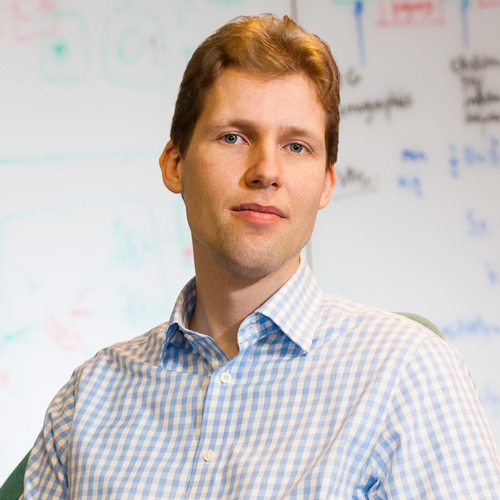Ton Dieker | Designing Systems for Performance and Efficiency
Dieker researches random processes and computer simulation algorithms, tools that run a model and predict what will happen in the future.
Hospitals account for a sizable share of America’s $3 trillion health care industry. Making them run efficiently is no easy task. Too many operating rooms, MRI machines, or beds, and hospitals risk wasting money. Too few, and they risk losing customers upset by long waits and lousy service.

Antonius "Ton" Dieker Associate Professor of Industrial Engineering and Operations Research —Photo by Timothy Lee Photographers
“On a regular day you may have enough capacity but every once in a while you’re going to get overwhelmed due to random events,” said Antonius “Ton” Dieker, an associate professor in the Department of Industrial Engineering and Operations Research and a member of the Data Science Institute. “How do you distribute resources over the network to best serve your customer base but not break the bank?”
In a perfect world, engineers build a system by analyzing similar systems and picking the one that performs best. If data is limited to the existing system, as it often is, they build a model to predict whether alternative designs might do better. “How can you set resource levels in a sensible way given the data you have on how the system currently works?” he said.
Dieker is an expert in random processes and computer simulation algorithms, tools that allow researchers to run a model and predict what will happen in the future. These tools are used in a variety of applications; by regulators, to predict how well banks can respond to a financial shock; by scientists, to predict future climate under various rates of carbon emissions; and by engineers to predict performance of different factory layouts.
Developing simulation algorithms often involves a trade-off between speed and accuracy. Slower algorithms may be more accurate but require massive and impractical amounts of computing power. Dieker’s work focuses on finding ways to improve speed and accuracy. In a recent paper in the journal Extremes, he and a colleague used techniques from probability theory to develop an algorithm that improved on the speed and accuracy of previous simulation algorithms for extreme rainfall prediction.
An interest in math and solving real world problems led Dieker to study operations research in his native Netherlands. His master’s thesis, in 2002, compared the output of all available simulation algorithms of fractional Brownian motion, a type of model that takes into account long-range dependencies. It continues to be a standard reference on fractional Brownian motion.
For his PhD, he studied the modeling, estimation, and simulation of rare events, and in a fellowship at the University College Cork in Ireland, he studied the connection between time delay systems and random matrices. In a second fellowship at IBM’s T.J. Watson Research Center in Yorktown Heights, NY, he examined workforce management systems.
Dieker joined Columbia Engineering in July 2014 from Georgia Tech. Among other projects, he applied resource allocation theory to elections planning in a county near Atlanta. He also explored ways to more effectively teach probability and statistics to high school students. A computer game he developed, Theme Park, gives students the chance to make capacity decisions of their own.
Dieker was awarded a 2016 Presidential Early Career Award for Scientists and Engineers (PECASE), the highest honor the U.S. government gives to young scientists and engineers. Other honors include the Erlang Prize from the Applied Probability Society of The Institute for Operations Research and the Management Sciences (INFORMS), an IBM faculty award, and an NSF CAREER award. Dieker also serves on the editorial boards of Operations Research and Mathematics of Operations Research.
MS, Vrije Universiteit Amsterdam (2002); PhD, University of Amsterdam (2006)
